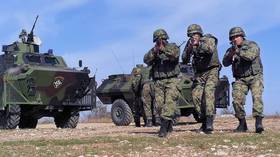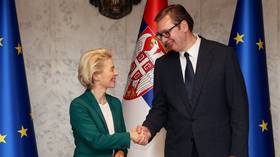Serbia puts military on high alert over Kosovo

Belgrade put its military on high alert on Tuesday as the breakaway region of Kosovo began implementing a plan to ban Serbian license plates, the country’s defense minister, Milos Vucevic, has announced.
Serbian President Aleksandar Vucic, who is also the commander-in-chief of the country’s armed forces, has ordered the military “to increase the level of combat readiness to be prepared to respond to any task,” Vucevic said in an interview with the broadcaster Happy TV.
“Serbia talking about peace and stability doesn’t mean that we’re weak, that we can be harassed and humiliated,” he pointed out, apparently addressing Kosovo’s leadership.
The country’s military, which is “many times stronger than it used to be,” remains fully committed to protecting all citizens of Serbia, including Serbs in Kosovo, the minister warned. “No one should doubt that,” he added.
However, Vucevic stressed that Belgrade wasn’t looking for conflict, saying that “it’s better to negotiate for a thousand days, than spend one day in the trenches.”
The situation in northern Kosovo where many Serbs reside has been tense. The local authorities began implementing their restrictions earlier in the day and issued the first warnings to vehicle owners with Serbian plates, he said.
According to Pristina’s plan, warnings will first be issued, followed by penalties of €150 (around $149). After a transition period ends in April 2023, drivers who failed to switch from Serbian to Kosovar license plates will have their cars seized.
The ban was initially slated to go into force on August 1, but it was postponed after Serbs in northern Kosovo set up roadblocks in preparation to resist the heavily armed special police that Pristina had deployed to the area.
Since then, the sides have been unable to find a way to resolve the deadlock. Last week, Vucic warned that attempts by Kosovo to restrict the movement of cars with Serbian license plates would “surely meet the democratic resistance of the Serbian people, and the state of Serbia will not allow the persecution and killing of its people.”
The US and many of its allies recognized the mainly Albanian-populated Kosovo as a sovereign state in 2008, but Serbia still considers the province a part of its territory. Belgrade is backed in this by others, including Russia and China, which do not recognize the territory as an independent entity.













